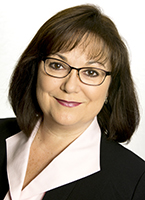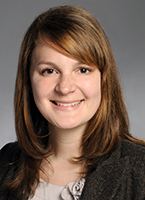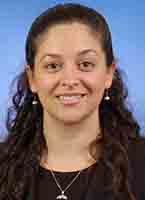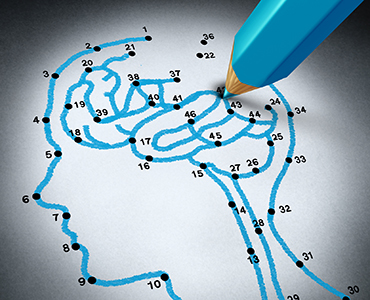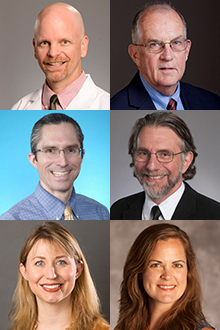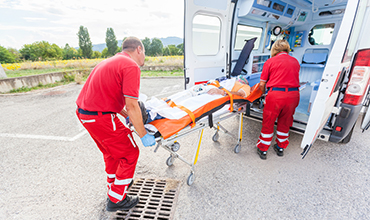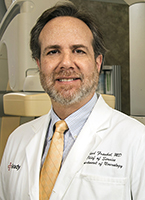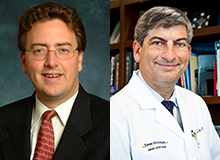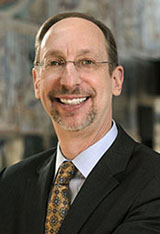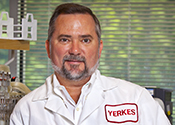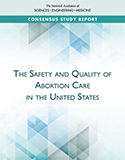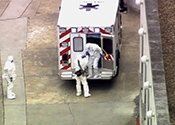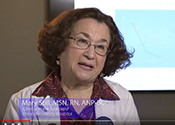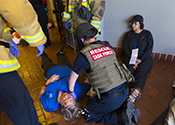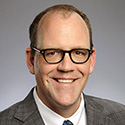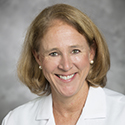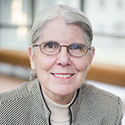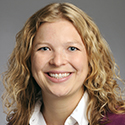

Emory role in Georgia Memory Net |
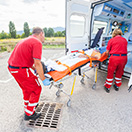
Reducing disability, death from stroke |

New accountable care agreement |
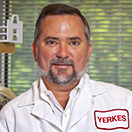 In brief |
|||||
| April 30, 2018 | ||||||||||||||||||||||||||
Small steps, big payoff
"New Designs for a New Era" was the theme of the 11th Emory Quality conference, sponsored by Emory Healthcare in partnership with Emory School of Medicine. Teams from Emory Healthcare, plus groups from Grady, Atlanta VA Medical Center, and Children's Healthcare submitted posters highlighting their efforts to improve quality in patient care. Winners were selected in nine categories.
Susan Reich, enterprise manager of quality for radiology imaging services, led the team that won the Best Overall Poster for an initiative to minimize delays for patients getting CT-guided interventions at Emory University Hospital Midtown. The first step was to assess exactly how the CT team was doing, and everyone was shocked by the results. Reich and her team found that 88% of cases were not starting on time, which they defined as beginning within 15 minutes of the appointment time. And 45% of the cases were starting more than 35 minutes past the appointment time. "The Midtown team wanted to do this project because they knew they had some problems with delays, but they were surprised by how big the problem was," says Reich. Reich and her team then observed 17 patients through the entire scan process, timing every step along the way to look for areas that could be improved. They found quite a few. For example, nurses would place a call to the CT technologist to ask if they were ready for the patient to be brought back. If the tech didn't pick up the call, the nurse might not try calling back for 10 to 15 minutes. The team did away with those calls and instructed the nurses to take the patients back 10 minutes before the scheduled scan. They began using disposable leads so the patient entered the scan room with them already in place, saving time in the scan room. "We found a number of steps like these that could save time," says Reich. "We basically defined everybody's role in the process and what should happen each step along the way." Reich's team's goal was to start half of all CT scans on time. In the end, they were able to begin between 68% to 72% of all scans on time, depending on the complexity of the patient's condition. "This project displayed a mastery of everything we hope to see in a project," says Nate Spell, director of the EHC Quality Academy and associate dean for education and professional development at the medical school, who oversees the poster competition. "They conducted very structured observations of their process, documented clear learning from that, and came up with a series of things to implement based on those observations. They got dramatic results that look like they are able to be sustained."
In the category of Outstanding Use of Reliability Principles, Katherine Baxter, pediatric surgery research fellow at Children's Healthcare of Atlanta, led the winning team. The goal was to see if using an enhanced recovery protocol with children undergoing colorectal surgery could reduce post-discharge opioid use. The enhanced recovery protocol, which has been used at Children's since 2015, is geared toward restoring bowel function earlier, which in turn leads to earlier discharge from the hospital. The protocol includes things such as using non-opioid post-op pain relief, limiting IV fluids, feeding patients sooner after surgery, and getting them up and walking earlier. The Children's colorectal surgery team had already looked at other outcomes related to the protocol, such as reduced length of stay, reduced in-house opioid use, and reduced readmission rates. This project focused on opioid use after discharge and found the percentage of children discharged on opioids decreased from 70% to 34%. Spell and the other judges were particularly impressed by the quality of the work done in the student category. "The winners of the Best Poster by a Student or Trainee performed as well as, if not better than, many of the other teams," says Spell. "The approach they took and the tools they applied were particularly impressive, considering they are students."
Julia Schiff, a fourth-year MD/MPH student, led that winning team on a project to provide linguistically competent care for refugee patients at the Clarkston Community Health Center. The team, which consisted of students from Emory schools of medicine, public health, nursing, and business, started by conducting an assessment. They found that nearly half of the center's patients had unmet language needs. They also determined which languages were most needed—Arabic, Burmese, Nepali, and Amharic. The students then divided into three teams. The first team translated printed materials and developed checklists and chart stickers for all languages. The second team focused on telephone interpreters. They updated the clinic's outdated list of interpreters and recruited a host of new volunteer interpreters. They also had phones installed in the exam rooms so these telephone interpreters could be accessed. The third team, on which Schiff served, recruited eight people from the Clarkston community to be trained in medical interpreting and then to work as interns in the clinic to provide interpretation services. "We were able to provide appropriate interpretation services for many more patients through this project, and we got good feedback from the clinic volunteers and staff," says Schiff.—Martha McKenzie Emory helps state with new network for Alzheimer's and other dementias
Emory clinicians and other experts are working with the state's Department of Human Services to implement a new program, Georgia Memory Net (GMN), to address the state's growing need for definitive diagnosis and care of those with Alzheimer's or other dementias. With $4 million in funding, the program will establish five regional diagnostic centers across Georgia, which will evaluate, diagnose, and assess current and future needs of affected individuals and their families. The five centers are expected to be established and engaged in training in a pilot phase by the end of June.
"The state legislature created the Georgia Memory Net to be proactive in addressing a burgeoning need for accurate diagnosis and follow-up services for citizens with memory impairment," says neurologist James Lah, who is co-director of the GMN, along with Allan Levey, neurology chair and director of Emory's Alzheimer's Disease Research Center (ADRC). "The program aims to provide a financially sustainable plan to mitigate suffering and save costs." The number of Georgians with Alzheimer's is currently about 140,000, a number expected to increase to 190,000 by 2025. Earlier diagnosis and treatment could alleviate symptoms and support well-being of patients and care partners and could also translate to a savings of $1.3 to $1.6 billion for the state by preventing unnecessary ER visits and hospital admissions. The program works like this: - GMN will provide resources and training to Georgia's primary care providers (PCPs) about how to conduct and bill for the Medicare-supported annual wellness visit (AWV) to ensure that screening for early memory loss and cognitive decline is included within the visit. - PCPs are encouraged to refer patients with such problems to a regional GMN center, where trained clinicians will initiate comprehensive assessments and care planning. - Each center will have a community services educator who will work with Area Agencies on Aging, the Alzheimer's Association, the Rosalyn Carter Institute for Caregiving, and other organizations to provide education and support for both patients and care partners. - The centers will communicate diagnosis and treatment recommendations back to the patient's PCP so the provider is better prepared to treat the patient's condition. The GMN will collect de-identified diagnostic data and share this information with the Georgia Alzheimer's Disease Registry, designed to monitor prevalence of Alzheimer's disease and other dementias across the state. GMN will also create and manage a larger IT infrastructure to monitor patient quality of health and life, care partner burden, and systemic or institutional burden. Over the long term, the GMN will track data provided by the Centers for Medicare and Medicaid Services relating to ER visits, repeated hospital admissions, and skilled nursing placements to help determine the estimated diversion of unnecessary care transitions and the resulting cost savings to the state.
The GMN represents a partnership among a variety of state, private, and academic institutions. Emory is the primary implementing partner in providing the GMN's clinical workflow model, with experts in Emory's ADRC providing training, funding, and ongoing evaluation for each GMN center. Other academic partners include Medical College of Georgia at Augusta University, Mercer University School of Medicine, and Morehouse School of Medicine. In addition to Lah and Levey, those at Emory helping lead these efforts include the following: Ted Johnson, (GMN lead, primary care training), Kenneth Hepburn (GMN lead, community services education core), Chad Hales (GMN lead, cognitive neurology), David Loring (GMN lead, neuropsychology), Laura Medders (GMN lead, social work services), and project director Rebecca Dillard. Read more. $15 million gift establishes Marcus Stroke Network
The Marcus Foundation recently donated $15 million to establish the Marcus Stroke Network, a partnership among Grady Health System, Emory School of Medicine, Boca Raton Regional Hospital, and the American Heart Association/American Stroke Association to help reduce stroke disability and death rates in the Southeast. The network aims to do the following: - Use telemedicine to accelerate early and definitive stroke treatment. - Establish the region's first mobile stroke unit, a specialized ambulance equipped with a CT scanner that allows medical teams to initiate lifesaving treatment for stroke patients before they reach the hospital. - Implement a new paradigm of acute stroke care by initiating a direct "ambulance-to-angiography" approach. - Support paramedics providing pre-hospital care to help with diagnosis and triage of stroke patients to the nearest appropriate hospital. - Enhance quality of care at participating network hospitals and ensure long-term sustainability through a Regional Coordinated Stroke System of care.
According to Michael Frankel, director of the new network, vascular neurologists and other medical professionals at Emory and Grady will provide real-time stroke guidance to emergency medicine doctors at remote sites around the region, helping make diagnoses and treatment recommendations for patients who have had acute strokes.
EHC signs accountable care agreement with Walmart
Emory Healthcare and Walmart recently announced a new accountable care plan (ACP) for Walmart associates at 55 Walmart, Sam’s Club, and Walmart Distribution Center locations throughout metro Atlanta. In addition, Emory University Orthopaedics & Spine Hospital (EUSOH) and Emory Orthopaedics & Spine Center will be included in Walmart's National spine and joint replacement surgery centers of excellence (COE) programs for Walmart associates in need of spine or joint care throughout the U.S. Both the ACP and COE agreements were effective January 1 of this year.
When Walmart approached Emory about these opportunities, we were excited to partner with them," says Patrick Hammond, CEO of Emory Healthcare Network. "More and more large, self-insured employers like Walmart are looking for ways to decrease costs of employee health care plans, while improving overall quality of care." Local Walmart associates can access care through the Emory Healthcare Network of more than 2,000 physicians who are geographically dispersed throughout metro Atlanta. They will pay standard co-pays for their primary care, specialist, and urgent care visits and have access to services provided in the COE program. Preventive visits will be free of charge. |
| From the Executive VP
Getting results
Don Berwick, keynote speaker at New Designs for a New Era: The 2018 Emory Quality Conference, says that the combined cost of waste in health care exceeds the U.S. defense budget by $50 million and is 17 times the size of the NIH budget. That's certainly a sobering thought, but the speakers, attendees, and poster presenters at the conference highlighted some of the many ways Emory is doing its part to change that statistic. In order to deliver on our promise and our obligation to our patients, our health care services need to provide the highest, most reliable quality and safety and the fastest, most convenient patient access—and all at the lowest possible cost. I was truly impressed by the breadth and depth of projects being undertaken across the enterprise to help our quality, safety, and value continually improve. Thanks to all who joined the conference in person and online and to all who are engaged in our daily efforts to provide the best possible care to the people we serve.Please direct questions and comments to
$12.7 million grant for oxytocin research
Yerkes and the Emory Brain Health Center received a five-year, $12.7 million grant from the National Institute of Mental Health to continue oxytocin research at the Silvio O. Conte Center for Oxytocin and Social Cognition. The goal of the research is to use CRISPR gene editing, optogenetics, and other cutting-edge technology in research with rodents and nonhuman primates to understand more precisely the way oxytocin acts in the brain, including its role in neural communication and social functioning. “We want to translate this knowledge to treatments to improve social functioning in disorders such as autism, schizophrenia, and other psychiatric conditions,” says Larry Young, who leads the Conte Center team. Read more. "All in a Day" results
Emory held its second 24-hour fundraising challenge in February. The event, “All in a Day: 24 Hours of Change,” raised a total of $1,002,251 from 3,415 gifts. Schools and centers within the Woodruff Health Sciences Center received generous donor support, led by the School of Medicine, which raised $98,168 from 140 gifts. The other health sciences units performed as follows: Rollins School of Public Health, $47,747; School of Nursing, $35,646; Winship, $10,281; Center for AIDS Research, $8,755; Brain Health Center, $7,380; Emory Healthcare, $6,180; Yerkes, $1,554. Emory faculty role in consensus report on abortion safety
Carol Hogue (epidemiology professor and Jules and Uldeen Terry Chair in Maternal and Child Health at Rollins) and Ruth Parker (professor of medicine) were part of a 13-member committee contributing to a new consensus study report, The Safety and Quality of Abortion Care in the United States, from the National Academies of Sciences, Engineering, and Medicine. Released March 16, the report was the first on this topic since 1975. Read more. SCDU in national Ebola exercise
Physicians, nurses, and staff in Emory's Serious Communicable Diseases Unit participated earlier this month in an exercise to test the nationwide ability to move patients with highly infectious diseases safely and securely to regional treatment centers. The exercise was led by the Department of Health and Human Services, with more than 50 organizations participating. Read more. Predicting Code MET
Emory University Hospital nurses and nursing school instructors Mary Still and Jennifer Vanderlaan are lead authors of an article in the current issue of the Journal of Nursing Care Quality that reports on a study of predictors of second medical emergency team (MET) activation within 24 hours of an initial event. Their findings also shed light on predictors of the initial event itself. Watch a video summarizing their findings. Active threat exercise
Last month, Emory held a full-scale active threat exercise in conjunction with the CDC and the six jurisdictions that comprise the Atlanta Urban Area Security Initiative (UASI). The UASI is a Department of Homeland Security grant program that assists urban areas in preventing, preparing for, and responding to terrorist attacks and other all-hazard emergencies. Played out over two days, the exercise was designed to test participating organizations’ response to a large-scale active threat within the Atlanta metropolitan region, according to Sam Shartar, senior director of Emory's Office of Critical Event Preparedness and Response. "This exercise scenario had been in the planning phase for a year and was chosen to test interfaces with Emory, City of Atlanta, and DeKalb County police," he says. This is particularly timely because of Emory's recent annexation into the city of Atlanta. Read more. Notable
Donald Harvey, director of Winship's Phase 1 Clinical Trials Unit, received the Award of Excellence from the Hematology/Oncology Pharmacy Association on March 22 in Denver. The annual award recognizes one pharmacy pioneer who has shaped practice and positively impacted trainees, treatments, and research.
Nursing professor Marcia Holstad received the Southern Nursing Research Society’s 2018 Distinguished Researcher Award. Holstad is director of Clinical and Social Science Integration for Emory's Center for AIDS Research (CFAR) and is one of the few nurses in the U.S. to have an administrative and collaborative role within CFAR. She has secured millions of dollars in external funding through more than 20 research grants from organizations such as the NIH, the U.S. Department of Education, and more and has been a principal investigator on five NIH-funded projects. Read more.
Denise Jamieson recently was named the James Robert McCord Chair in Gynecology and Obstetrics. Jamieson directs the department's Division of Gynecologic Specialties and is vice chair of Population Health. Created with funds donated by Cordelia Scaife May in 1966, the chair is named for one of the medical school's early volunteer faculty members. Read more about the Jamieson appointment.
Rollins faculty Michael Kutner and Ying Guo (Biostatistics and Bioinformatics) were recently recognized by the American Statistical Association (ASA). Kutner received the ASA Mentoring Award, and Guo was named an ASA fellow. Read more.
Long-time Rollins faculty member Kathleen Miner received the 2018 Charles R. Hatcher Jr. Award for Excellence in Public Health. An educator for more than 35 years, Miner is associate dean for applied public health and professor in the Executive MPH program and in Behavioral Sciences and Health Education. The Hatcher award was established in 1996 to honor faculty in health sciences who exemplify excellence in public health through their lifetime of work. Read more.
Rachel Patzer has been named director of the newly inaugurated Health Services Research (HSR) Center, a cooperative initiative of the departments of Medicine and Surgery in the medical school. She will develop and enact a strategic plan for HSR advancement in the combined center, as well as nurture collaborative efforts in HSR across the schools of Medicine, Public Health, and Nursing; the CDC; Grady Hospital; Children’s Healthcare of Atlanta; the Atlanta VA Medical Center; and other related Emory departments and school areas that do similar research. Read more. Events May 9: 5th Annual Health Services Research Day. 8-3, SOM 110. More info. May 9: Nanofans Forum: Biophotonics in Medical Diagnostics. 11- 2:30, Marcus Nanotechnology Bldg, Georgia Tech campus. More info. June 8: 2018 Southeastern Pediatric Research Conference: Precision Medicine. 8-5, Georgia Aquarium. More info. Oct 13: 8th Annual Winship Win the Fight 5K. 8:30, Emory Quad. More info. |


